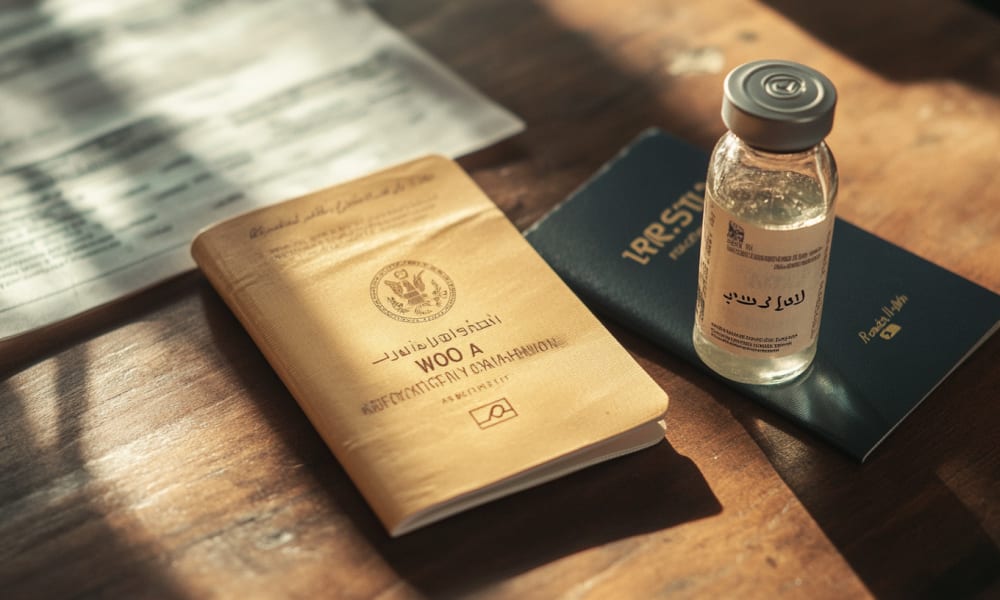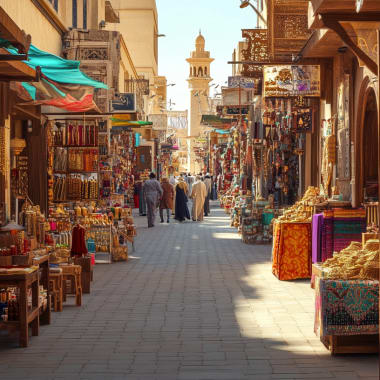
Vaccinations and health precautions for Bahrain
Well prepared in the Gulf state: Why health precautions are essential for a trip to Bahrain
Well prepared in the Gulf state: Why health precautions are essential for a trip to Bahrain
Anyone planning a trip to Bahrain looks forward to fascinating desert landscapes, modern cities, and a rich cultural history. However, for the trip to go smoothly from a health perspective, careful preparation is essential. In Bahrain, travelers encounter extreme climatic conditions, regional infection risks, and hygiene challenges that make targeted health precautions sensible and necessary.
Whether it's heat, travel-related diarrhea, hepatitis, or risks from animal contact – many health hazards can be avoided through vaccinations, a well-equipped travel pharmacy, and proper behavior on site. Timely travel medical advice helps ensure that your vaccination coverage is up-to-date and addresses individual risk factors. Furthermore, taking out a comprehensive foreign health insurance policy, including repatriation coverage, can be crucial in an emergency.
In short: Those who travel well-prepared not only protect themselves but also ensure a safe and relaxed stay in the Kingdom of Bahrain. In the following sections, you will learn which vaccinations are recommended, what risks to consider, and what precautions you can take for safety on the go.
Basic and special vaccinations for Bahrain
A thoughtful vaccination plan is a central part of preparing for a trip to Bahrain. While there are no mandatory vaccinations required for entry from Germany, official recommendations – such as those from the Foreign Office or WHO – clearly advocate for current standard vaccination coverage as well as targeted travel vaccinations, depending on the type of stay and individual risk factors.
Basic vaccinations
Regardless of the travel destination, all standard vaccinations according to the vaccination calendar of the Standing Committee on Vaccination (STIKO) should be up to date. These basic immunizations reliably protect against globally occurring infections and are also relevant for Bahrain. Especially when traveling with children or on longer stays, it is important to ensure complete vaccination coverage.
These include:
- Measles, mumps, rubella (MMR)
- Tetanus, diphtheria, whooping cough (pertussis)
- Poliomyelitis (polio)
Mandatory vaccination for yellow fever:Required only when entering from a yellow fever area or for transit stays of over 12 hours in such countries (from 9 months). This requirement does not apply for direct travelers from Germany.
Special vaccination recommendations
Depending on the type of trip – for example, adventure travel, long-term stay, or close contact with the local population – additional vaccinations may be advisable. Especially when staying in simple accommodations or traveling to rural areas, the risk of infection increases.
Recommended travel vaccinations at a glance:
| Illness | Vaccine available? | Recommendation | Note |
|---|---|---|---|
| Hepatitis A | Yes | For all travelers | Transmitted through water/food |
| Hepatitis B | Yes | For long-term stays, close contact | Also relevant for medical procedures |
| Typhoid | Yes | In poor hygienic conditions | Especially with backpacking |
| Meningococci | Yes | With close contact/mass events | Situationally recommended |
| Measles, mumps, rubella | Yes | Standard vaccination | Should be up to date |
| Tetanus, diphtheria, pertussis, polio | Yes | Standard vaccination | Check for booster |
| Yellow fever | Yes | Only when entering from yellow fever areas | Mandatory from 9 months |
For chronically ill, elderly, or immunocompromised individuals, a seasonal flu vaccination may also be advisable. Diseases such as leishmaniasis or phlebotomus fever cannot be prevented by vaccinations – consistent mosquito defense is necessary.
Hepatitis vaccination
Hepatitis is one of the most significant travel-related infection risks in Bahrain:
- Hepatitis Ais transmitted fecal-oral through contaminated water or food. The vaccination protects effectively and is recommended for all travelers to Bahrain.
- Hepatitis Bis transmitted through blood or other body fluids. Vaccination is particularly advised for longer stays, close contact with the local population, or medical procedures.
Important:Some vaccinations require multiple doses and time to build complete protection. Therefore, a travel medical consultation should occur at least six weeks before departure to implement individual precautions in a timely manner.
Health risks and precautions
Traveling safely: Typical health risks in Bahrain and how to protect yourself against them
A stay in Bahrain is a fascinating experience for many travelers, but to ensure that health incidents do not become a travel companion, a sound risk assessment is essential. Climatic conditions, hygiene practices, and certain infection risks differ significantly from European standards. Those who inform themselves in advance and prepare accordingly can substantially minimize many health hazards.
Risk assessment for infections
There are no vaccination mandates for travelers from Germany to Bahrain; however, some vaccinations are urgently recommended. In addition to standard vaccinations such as tetanus, diphtheria, pertussis, polio, and measles, you should particularly consider hepatitis A, which is transmitted through contaminated food or water. For longer stays or close contact with the local population, a hepatitis B vaccination may also be advisable. Diseases such as HIV, Mpox, or hepatitis B, C, and D are primarily transmitted through sexual contact or unsterile medical procedures – here, consistent caution is essential.
Contact with animals should be avoided, particularly with camels, as they are considered carriers of the Middle East Respiratory Syndrome (MERS). Although only a few cases have been documented in Bahrain so far, there is still a certain residual risk. Venomous sea snakes can also occur near the coast – immediate medical attention is necessary in case of a bite.
Avoiding gastrointestinal diseases
Gastrointestinal diseases are among the most common health complaints while traveling. In Bahrain, they usually arise from contaminated water or poorly prepared food. To avoid diarrhea and other infections, only drink bottled or boiled water, and refrain from consuming ice cubes, raw foods, and unpasteurized dairy products. Thorough handwashing and food hygiene are also essential, especially before eating and after using the restroom.
Malaria prophylaxis and yellow fever risk
Bahrain is considered malaria-free – therefore, malaria prophylaxis is not necessary. However, it is advisable to use mosquito repellent to prevent other insect-borne diseases such as leishmaniasis. A yellow fever vaccination is only required if you enter from a yellow fever area or have stayed there in transit for more than 12 hours. In this case, a valid vaccination certificate starting from 9 months of age is mandatory.
With good preparation and adapted behaviors, the main health risks in Bahrain can be avoided. In the next sections, we will show you what other measures – from the travel pharmacy to behavior in emergencies – are sensible for a completely secure stay.
Health precautions before and during the trip
Travel well prepared – for a safe stay in Bahrain
Careful medical preparation is the key to a worry-free trip to Bahrain. Before departure, you should not only check your vaccination status but also compile a personalized travel pharmacy. During your stay, conscious hygiene, appropriate sun protection, and careful behavior significantly contribute to preventing health problems.
Preparation of the travel pharmacy
A well-equipped travel pharmacy is indispensable – it saves you valuable time in an emergency. In addition to pain and fever medications such as paracetamol or ibuprofen, it should also include medications for diarrhea, electrolyte solutions, disinfectants, band-aids, dressing materials, as well as sunscreen and mosquito repellent. Additionally, bring enough of your regularly needed medications, ideally distributed between hand and travel luggage. For prescription medications, a doctor's note in English is recommended to avoid problems during entry.
Special precautions
Travelers with special needs – such as children, elderly people, or pregnant women – should seek medical advice well in advance. For them, additional vaccinations or tailored precautionary measures may be advisable. Travelers with chronic illnesses should also discuss emergency medications and potential health risks with their doctor. Comprehensive foreign health insurance, including repatriation coverage, is advisable in any case – this way, you are also covered in unforeseen incidents.
Reducing infection risk on site
During your trip to Bahrain, simple measures can help minimize health risks. Consistently pay attention to drinking water and food hygiene, avoid raw foods, and wash your hands regularly. Avoid contact with animals – especially camels. The intense sun requires a high SPF, sunglasses, and adequate fluid intake. Also, adapt to the hot desert climate and avoid physical exertion during midday heat.
Those who take these precautions create the ideal foundation for a healthy and relaxed time in Bahrain.
Emergency management and medical care
Quick help in an emergency – how you are well medically covered in Bahrain
Even with the best preparation, unforeseen health incidents can occur while traveling. Therefore, it is reassuring to know that Bahrain has reliable emergency management and high-quality medical care. Those who inform themselves before departure, keep important documents ready, and respond correctly in an emergency can act quickly and purposefully. In this section, you will learn how the healthcare system in Bahrain works, what facilities are available, and what you should do in an emergency.
Dealing with medical facilities
Bahrain has a modern and well-organized medical infrastructure that provides travelers with quick and reliable care in emergencies. In urban areas like Manama, medical care is excellently accessible, and there are also enough clinics and health centers available in more rural regions. The level of care is generally comparable to that in Germany – both public and private institutions are technically up-to-date and cover a wide range of medical services.
Especially reassuring: The medical staff usually speaks English, which greatly facilitates communication during treatments. Bahrain is also heavily investing in digitization – including the National Civil Protection Platform, which provides real-time information in crisis situations. To avoid wasting valuable time in an emergency, it is advisable to store the contact details of the nearest clinics as well as important emergency numbers (central: 999) in your smartphone before traveling.
Tips for emergencies
A medical emergency can occur at any time – whether from a snake bite, heat stroke, or an allergic reaction. With the right preparation and a clear action plan, you can keep a cool head even in stressful situations. In an emergency, first assess the vital signs of the affected person (breathing, circulation) and call the emergency number 999. Provide the location, type of emergency, and visible symptoms as accurately as possible.
Give first aid, reassure the affected person, and avoid unnecessary movements in case of possible injuries. Keep important documents such as insurance confirmations or medical certificates ready to facilitate seamless follow-up treatment. Particularly important: Bring enough of your regularly needed medications, ideally with an English-language confirmation from your doctor. A medical evacuation insurance provides additional protection should repatriation become necessary.
With these measures, you are well prepared for medical emergencies in Bahrain – and can start your trip with a sense of security.
Discover the Orient with experts who have explored every corner themselves
Your dream holiday, tailor-made by experts.
We don't just know the Middle East from books, we visit the country several times a year to experience the culture, landscape and people first-hand.
From your first enquiry to your return home, we are there for you personally - by phone, email or WhatsApp, whenever you need us. Our trips are as unique as you are: individually planned and provided with exclusive privileges and high-quality arrangements that will make your trip unforgettable.
Experts for your Orient trip







